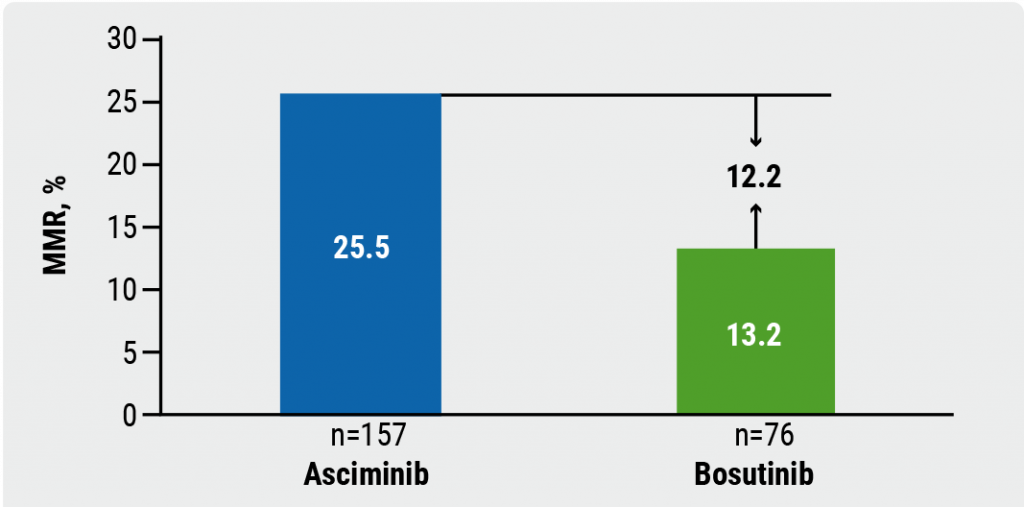Dr Jennifer Woyach (Ohio State University, OH, USA), who presented the updated results of the A041202 trial during the 63rd annual meeting of the American Society of Hematology (ASH 2021), which was held 11-14 December, as both a virtual and on-site event in Atlanta, Georgia, USA.
The phase 3 A041202 trial was designed to compare treatment outcomes between chemoimmunotherapy and ibrutinib-based regimens in older patients with previously untreated, symptomatic CLL. For this purpose, 547 patients ≥ 65 years with CLL, featuring creatine clearance levels ≥ 40 mL/min, bilirubin levels ≤ 1.5 ULN, and without the presence of life-limiting intercurrent illness or the need for warfarin therapy, were randomised 1:1:1 to bendamustine plus rituximab (arm 1), ibrutinib (arm 2), or ibrutinib plus rituximab (arm 3). Patients who were randomised to the chemoimmunotherapy arm who showed progressive disease during the study could crossover to the ibrutinib arm. Previous results demonstrated that ibrutinib-based regimens outperformed bendamustine plus rituximab in terms of PFS. Dr Woyach presented the updated results of trial.

After a median follow-up of 55 months, the median PFS was 44 months in the bendamustine plus rituximab arm (95% CI 38-54) and had not yet been reached in the ibrutinib-based arms of the trial. Corresponding hazard ratios of the chemoimmunotherapy arm versus the ibrutinib alone arm (HR 0.36, 95% CI 0.26-0.52), P<0.0001) or the chemoimmunotherapy arm versus the ibrutinib plus rituximab arm (HR 0.36, 95% CI 0.25-0.51) displayed equal PFS benefits of the ibrutinib-based regimens. In addition, the 48-month PFS estimates were 76% for both arms 2 and 3, and 47% for the bendamustine plus rituximab arm. With overall survival rates of 84%, 85%, and 86% for arm 1, 2, and 3, respectively, the current interim analysis did not show significant differences in OS between the treatment arms. Dr Woyach confirmed that the current data indicate that the addition of rituximab to ibrutinib does not deliver extra benefits in terms of PFS or OS in this patient population. “However, we do not know for sure if this finding extends to all anti-CD20 monoclonal antibodies, such as obinutuzumab. That needs to be established in future trials. Currently we are enrolling patients in the Alliance A041702 study (NCT03737981), which is comparing Ibrutinib/obinutuzumab to ibrutinib/venetoclax/obinutuzumab. This study builds upon the success of ibrutinib in the A041202 study and investigates whether adding venetoclax would be more effective and allow for successful discontinuation of therapy.”
Subgroup analyses revealed that the ibrutinib regimens were superior to the chemoimmunotherapy arm across subgroups defined by TP53 abnormalities, del(11q), karyotype, and IGHV mutation status. Again, rituximab did not demonstrate an additional benefit to ibrutinib in terms of PFS. There were no interaction effects between treatment arm and del(11q), IGHV, or karyotype. However, patients with TP53 abnormalities benefitted significantly more from ibrutinib therapy than from chemoimmunotherapy (P<0.001). In the bendamustine plus rituximab arm, patients with TP53 abnormalities had worse PFS outcomes than patients without TP53 abnormalities (HR 5.32, 95% CI 3.05-9.27, P<0.001). In contrast, patients with TP53 abnormalities did not show inferior PFS outcomes than patients without TP53 abnormalities in the ibrutinib arms (HR 0.99, 95% CI 0.51-1.91, P=0.98).
With prolonged therapy duration, the incidence of atrial fibrillation increased in the ibrutinib arms. All grade atrial fibrillation was reported in 6% of the patients treated with bendamustine plus rituximab and in 19% of the patients on ibrutinib. Also, the incidence of all-grade hypertension was higher in patients who received ibrutinib (73%) than in patients who received chemoimmunotherapy (54%).
According to Dr Woyach, hypertension and atrial fibrillation are side effects that can be seen with ibrutinib as well as with other BTK inhibitors: “Unlike some of the other BTK-associated side effects, which tend to occur early, atrial fibrillation and hypertension can happen at any time during the course of therapy. In the Alliance A041202 study, atrial fibrillation was observed in approximately 15% of the patients. This rate is higher than the rate of atrial fibrillation that has been reported in previous studies that primarily included younger patients. The Alliance A041202 trial only included patients ≥ 65 years of age. Therefore, the data of our safety analysis suggests that atrial fibrillation, as a side effect of ibrutinib, is seen more frequently in older patients.”
Dr Woyach explained that there are some limitations extrapolating the results from particular subgroups of patients, since the study was not powered to do analyses on some of these smaller subgroups of patients. “Since we were only able to retrieve the IGHV mutational status on two thirds of our patient population, it is difficult to know whether results specifically stratified by this risk factor are generalisable. Nonetheless, I think this is a definitive study for the benefit of ibrutinib containing regimens over chemoimmunotherapy for older patients with CLL. Our data showed that about 75% of the patients treated with ibrutinib or ibrutinib plus rituximab remain alive and free of progression after 4 years of follow-up. Therefore, these regimens have demonstrated to be more effective than chemoimmunotherapy for older patients with CLL. Moreover, the benefit of ibrutinib over bendamustine plus rituximab extends to all subgroups, but is particularly striking in those with high-risk genetic features, such as TP53 abnormalities.”
- Woyach JA, et al. Long-Term Results of Alliance A041202 Show Continued Advantage of Ibrutinib-Based Regimens Compared with Bendamustine Plus Rituximab (BR) Chemoimmunotherapy. O642, American Society of Hematology Annual Meeting and Exhibition (ASH 2021), 11-14 December, 2021.
Copyright ©2021 Medicom Medical Publishers
Posted on
Previous Article
« Phase 3 GLOW: first-line ibrutinib plus venetoclax improves outcomes in elderly or unfit CLL Next Article
Community Rheumatology Clinics: Pegloticase safe and effective with any immunomodulator »
« Phase 3 GLOW: first-line ibrutinib plus venetoclax improves outcomes in elderly or unfit CLL Next Article
Community Rheumatology Clinics: Pegloticase safe and effective with any immunomodulator »
Related Articles
June 15, 2023
Next-generation cell therapies for cancer: CAR-NK cells

© 2024 Medicom Medical Publishers. All rights reserved. Terms and Conditions | Privacy Policy

